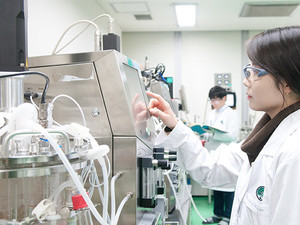
[이코노믹리뷰=황진중 기자] It seems that the conditional approval of the new lung cancer drug’Lasertinib’ that Yuhan Corporation (000100) is developing in Korea is imminent. The company recently registered the trademark A (tentative name). The Intellectual Property Office classified the trademark as related to pharmaceuticals.
Razertinib is considered the best achievement of Yuhan Corporation’s R&D last year. The management of Johnson & Johnson (J&J), the parent company of Janssen, a global pharmaceutical company that introduced lasertinib technology, expressed expectations for the drug at the’JP Morgan Healthcare Conference (JPMHC)’, the largest conference related to pharmaceutical bio investment.
Trademark A, lasertinib product name strong
According to the pharmaceutical bio industry on the 14th, Yuhan Corporation registered the trademark A with the Korean Intellectual Property Office in relation to product classification No. 05. Product category 05 includes veterinary drugs, medical drugs, pharmaceutical drugs, human drugs, human and animal drugs, and therapeutic drugs.
The application for trademark registration was filed on September 9 of last year. The Intellectual Property Office made a decision to register on December 22 of the same year. The expiration date of the duration is December 29, 2030.
The industry believes that the conditional approval of Lasertinib is imminent. According to industry sources, Yuhan Corporation submitted an application for conditional permission to administer lasertinib alone in the third quarter of last year to the Ministry of Food and Drug Safety. It is expected to receive conditional approval within the first quarter of this year.
Hana Financial Investment analyst Seon Min-jeong explained, “If we obtain conditional approval in the first quarter of this year, we expect to generate sales of Lasertinib in Korea.”
Razertinib is a third-generation EGFR TKI (tyrosine kinase inhibitor), and is considered a new drug that has proven its therapeutic effect on the T790 mutation, which is known as a resistant mutation of the first and second generation anticancer drugs. This new drug represents a mechanism to inhibit the signal transduction and growth of cancer cells by inhibiting the EGFR mutation activity.
The first to third generation TKIs are known to be effective in the treatment of EGFR mutant non-small cell lung cancer. The third-generation EGFR TKI is AstraZeneca’s Tagriso. Treatment with lasertinib also showed a response rate of more than 30% in patients with resistance to tagriso.
J&J executives “Expectation of lasertinib combination therapy is high”
The management of Janssen parent company J&J, who introduced lasertinib technology from Yuhan Corporation, expressed expectations for the combination therapy of the dual anticancer antibody’amivantamab’ and lasertinib in JPMHC2021. The combination therapy is expected to change the paradigm of non-small cell lung cancer (NSCLC) treatment.
Joe Wolk, J&J Chief Financial Officer (CFO), said, “Amivantamab, which completed an application for approval from the US Food and Drug Administration (FDA) last year, is expected to acquire the first indications as a monotherapy.” The combination therapy with lasertinib is expected to have a greater effect on the treatment of non-small cell lung cancer in the future by creating an excellent synergy.”

The expectation appears to be based on the results of an interim global clinical analysis on the combination of amivantamab + lasertinib announced at the European Oncology Society (ESMO2020) held last year. The combination of amivantamab + lasertinib recorded an objective response rate (ORR) of 100% in 20 patients with EGFR mutant non-small cell lung cancer without prior treatment experience.
Among 45 patients with non-small cell lung cancer who developed resistance after administration of the competing drug tagriso, 16 tumors decreased, and ORR was 35%. One in 16 patients showed complete remission (CR) with complete tumor disappearance.
Janssen is spurring the clinical trials of amivantamab + lasertinib. The company started phase 3 of MARIPOSA, which evaluates the effectiveness of amivantamab + lasertinib treatment for non-small cell lung cancer patients with EGFR exon 19 deletion or exon 21 substitution mutations in October last year.
An industry insider explained, “Lasertinib is Yuhan’s representative open innovation achievement,” and “a drug with global competitiveness as an anticancer drug that is expected to have high therapeutic effects.”
